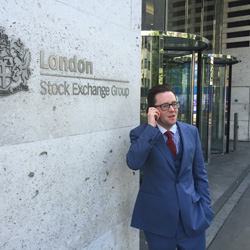You just know it’s going to be a bad day when it’s time to report a 17% decline in pretax profit for any period. This morning, HSBC Holdings (LSE:HSBA), Europe’s largest bank, reported a 17% decline for the entire 12 months ending 31 December. The company’s share price followed suit post-announcement, falling more than 5.1% to 574.00 after falling to a low of 566.00, which also became the bank’s new 52-week low.

The news sent investors scurrying to either shed some shares or to buy low and hope that things will get better at the bank before they get worse. Nearly 50 million shares have been traded today against an average of 23 million per day over the last three months.
It’s Not Easy Being a Bank
In this morning’s report Group Chairman Douglas Flint bemoaned that, “The recent disclosures around unacceptable historical practices … remind us of how much there still is to do and how far society’s expectations have changed in terms of banks’ responsibilities. They are also a reminder of the need for constant vigilance over the effectiveness of our controls and the imperative to embed a robust and ethical compliance culture.”
Later in the report he said, “Restoration of trust in our industry remains a significant challenge as further misdeeds are uncovered but it is a challenge we must meet successfully. We owe this not just to society but to our staff to ensure they can be rightly proud of the organisation to which they have committed their careers. When commentators extrapolate instances of control failure or individual misconduct to question the culture of the firm it strikes painfully at the heart of our identity.”
Reasons Why It’s Not Easy Being a Bank
Refer to the bold portions of Flint’s statements, upon which I shall now proceed to expound.
- Disclosures around unacceptable historical practices. Mr. Flint’s statement is deceptive. It is not “the recent disclosure” of these practices that is the problem. It is that the practices to which he refers are simply unacceptable. Period. The disclosure is simply your wrongdoing being revealed. It’s not easy being a bank because bank executives want to put the blame elsewhere.
- Society’s expectations have changed. Again, Mr. Flint has missed the mark, and this apparent ignorance really scares me. Society’s expectations have not changed. Society has expected bank’s to treat customers with respect, protect their assets under your care, and to deal ethically at all levels from the basement to the boardroom. That has never changed. It’s not easy be a bank because banks doing understand society’s expectations.
- Banks’ responsibilities. For this point, I refer Mr. Flint to an article published in 2010, “What Special Responsibilities Does a Large Bank Have?” Those responsibilities include guarding the safety and soundness of the banking system, protecting the free-enterprise system, acting as role models for smaller banks, and to live in the real world. To this latter point, that article pointed out that, “They cannot concoct fantasies either for the investing public, customers, or internally among employees. They must not be enslaved to quarter by quarter numbers and must not live in a Through the Looking Glass world.” It’s not easy being a bank because banks tend to ignore the real world.
- Restoration of trust in our industry. Mr. Flint got it right on this one. Unfortunately, if HSBC – or any other bank – attempt to restore trust without getting the first three points right, that trust will never be restored. It’s not easy being a bank, because nobody trusts banks.
- As further misdeeds are uncovered. What? There’s more? No wonder it’s not easy being a bank.
- The worst statement of all. “When commentators extrapolate instances of control failure or individual misconduct to question the culture of the firm it strikes painfully at the heart of our identity.” This is one of the most blatant instances of blame-shifting that I have ever seen anywhere in print. Control failure and individuals misconduct have become the identity of banking. It is not the fault of commentators.
The failure of bank chairmen and CEOs to acknowledge their wrongdoings without accepting the full responsibility for their personal and corporate actions will continue to sustain the highly-warranted lack of trust in their banks. Statements like the ones discussed today do not give rise to any hope for customers or investors and ought to “strike painfully at the heart of [their] identity,” not the banks’.


 Hot Features
Hot Features













